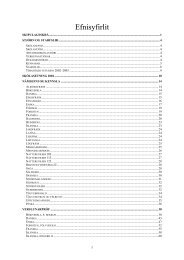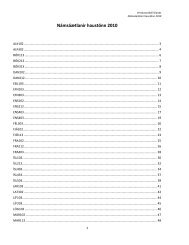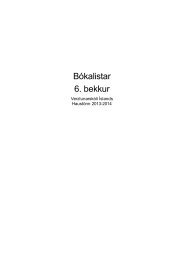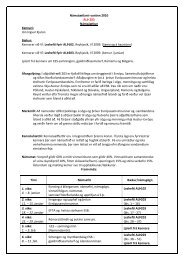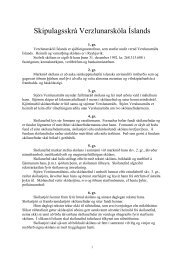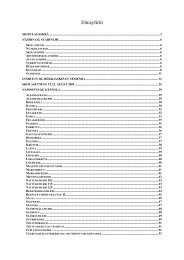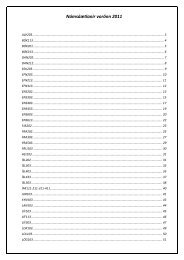Skólaskýrsla 2004 - Verzlunarskóli Ãslands
Skólaskýrsla 2004 - Verzlunarskóli Ãslands
Skólaskýrsla 2004 - Verzlunarskóli Ãslands
You also want an ePaper? Increase the reach of your titles
YUMPU automatically turns print PDFs into web optimized ePapers that Google loves.
The early farmer learned to watch the face of the sky. He hunted, fished, sowed, reaped,<br />
danced and performed religious ceremonies at the times the heavens dictated. Soon<br />
particular constellations received the names of the activities their appearance sanctioned.<br />
Sagittarius, the hunter, and Pisces, the fish, are still in the sky.<br />
The heavens decided the time of events. But such imperious masters would tolerate no delay<br />
in compliance with their orders. The farmer in many hotter countries, who made his living<br />
by tilling the soil, which the river covered with rich silt during its annual overflow of the<br />
fields, had to be well prepared for the flood. His home equipment, and cattle had to be<br />
temporarily removed from the area, and arrangements made for sowing immediately<br />
afterwards. Hence the coming of the flood had to be predicted. Not only in hotter countries,<br />
but in all lands it was necessary to know beforehand the time for planting and the coming of<br />
holidays and days of sacrifice.<br />
Prediction was not possible, however, by merely keeping count of the passing days and<br />
nights. For the calendar year of 365 days soon lost all relation to the seasons just because it<br />
was short by a quarter of a day. Prediction of a holiday or a river flood even a few days in<br />
advance required an accurate knowledge of the motions of the heavenly bodies and of<br />
mathematics that was possessed only by the priests. These holy people, knowing the<br />
importance of the calendar for the regulation of daily life and for provident preparation,<br />
exploited this knowledge to retain dominance over the uninformed masses. In fact, it is<br />
believed that many early priests knew the solar year, that is the year of the seasons, to be<br />
365.25 days in length, but deliberately withheld this knowledge from the people. Knowing<br />
also when the flood was due, the priests could pretend to bring it about with their rites,<br />
while making the poor farmer pay for the performance.<br />
Wonder about the heavens eventually led, via the respectable science of astronomy, to<br />
mathematics. Meanwhile, religious mysticism, itself an expression of wonder about life,<br />
death, wind, rain and the panorama of nature, became concerned with mathematics through<br />
astrology. Of course, the importance of astrology in ancient religions must not be judged by<br />
its current discredited position in most cultures. In almost all these religions, the heavenly<br />
bodies, the sun especially, had personalities and cosmic influences over events on Earth.<br />
The wills and plans of these bodies might be fathomed by studying their activities, their<br />
regular comings and goings, the sudden visitations of meteors, and the occasional eclipses<br />
of the sun and moon. It was as natural for the ancient priests to work out a formula for the<br />
divination of the future based on the motions of the planets and star constellations as it is for<br />
the modern scientist to study and master nature with his techniques.<br />
46 What was the initial urge which prompted man to study the stars and planets?<br />
c a desire to improve the woefully inadequate mathematics of the time<br />
c the desire to unravel the wonders of nature<br />
c the need for life to be regulated by an accurate calendar<br />
c the need to develop methods of navigation<br />
47 Primitive farmers made a careful watch of the sky.<br />
c for guidance in their religious rituals and ceremonies<br />
c to receive comfort in times of hardship<br />
c to receive the blessing of particular constellations<br />
c to see when certain activities should be performed<br />
48 Farmers in hotter countries needed to know when rivers would flood because.<br />
c the results were always disastrous<br />
c their prosperity was dependent on it<br />
123



